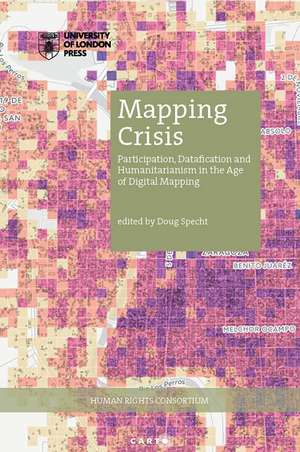Mapping Crisis: Participation, Datafication and Humanitarianism in the Age of Digital Mapping: HRC series
Editat de Doug Spechten Limba Engleză Paperback – 15 sep 2020
Preț: 337.24 lei
Nou
Puncte Express: 506
Preț estimativ în valută:
64.53€ • 66.57$ • 53.85£
64.53€ • 66.57$ • 53.85£
Carte indisponibilă temporar
Doresc să fiu notificat când acest titlu va fi disponibil:
Se trimite...
Preluare comenzi: 021 569.72.76
Specificații
ISBN-13: 9781912250332
ISBN-10: 1912250330
Pagini: 230
Dimensiuni: 152 x 229 x 23 mm
Greutate: 0.52 kg
Ediția:Nouă
Editura: University of London Press
Colecția University of London Press
Seria HRC series
ISBN-10: 1912250330
Pagini: 230
Dimensiuni: 152 x 229 x 23 mm
Greutate: 0.52 kg
Ediția:Nouă
Editura: University of London Press
Colecția University of London Press
Seria HRC series
Notă biografică
Doug Specht is director of teaching and learning at the University of Westminster. He has taught across a range of age groups and educational settings around the world.
Cuprins
Mapping Crisis: a reflection on the Covid-19 pandemic
Doug Specht
Introduction: mapping in times of crisis
Doug Specht
1. Mapping as tacit representations of the colonial gaze
Tamara Bellone, Salvatore Engel-di-Mauro, Francesco Fiermonte, Emiliana Armano and Linda Quiquivix
2. The failures of participatory mapping: a mediational perspective
Gregory Asmolov
3. Knowledge and spatial production between old and new representation: a conceptual and operative framework
M. Rosaria Prisco
4. Data colonialism, surveillance capitalism and drones
Faine Greenwood
5. The role of data collection, mapping and analysis in the reproduction of refugeeness and migration discourses: reflections from the Refugee Spaces project
Giovanna Astolfo, Ricardo Marten Caceres, Falli Palaiologou, Camillo Boano and Ed Manley
6. Dying in the technosphere: an intersectional analysis of European migration maps
Monika Halkort
7. Now the totality maps us: mapping climate migration and surveilling movable borders in digital cartographies
Bogna M Konior
8. The rise of the citizen data scientist
Aleš Završnik and Pika Šarf
9. Modalities of united statelessness
Rupert Allan
Doug Specht
Introduction: mapping in times of crisis
Doug Specht
1. Mapping as tacit representations of the colonial gaze
Tamara Bellone, Salvatore Engel-di-Mauro, Francesco Fiermonte, Emiliana Armano and Linda Quiquivix
2. The failures of participatory mapping: a mediational perspective
Gregory Asmolov
3. Knowledge and spatial production between old and new representation: a conceptual and operative framework
M. Rosaria Prisco
4. Data colonialism, surveillance capitalism and drones
Faine Greenwood
5. The role of data collection, mapping and analysis in the reproduction of refugeeness and migration discourses: reflections from the Refugee Spaces project
Giovanna Astolfo, Ricardo Marten Caceres, Falli Palaiologou, Camillo Boano and Ed Manley
6. Dying in the technosphere: an intersectional analysis of European migration maps
Monika Halkort
7. Now the totality maps us: mapping climate migration and surveilling movable borders in digital cartographies
Bogna M Konior
8. The rise of the citizen data scientist
Aleš Završnik and Pika Šarf
9. Modalities of united statelessness
Rupert Allan
Recenzii
"The development of web 2.0 technologies applied to mapping was at first heralded as a means of democratizing online mapping by enabling everyday people to collect and share spatial data across an array of digital media. However, this edited volume demonstrates and critiques the misapplication of web mapping and provides many examples of how the technology can reinforce neocolonialism in the developing world or promote 'datafication,' understood as the use of individuals as data resources to exploit for profit. . . .Overall, this text will be welcomed by readers interested in a mature discussion of the social implications of web mapping technologies, including graduate and advanced undergraduate students in geography, global studies, human rights, political science, and science and technology studies programs."



